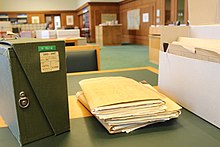Project for full digital access to the League of Nations archive
The project for full digital access to the League of Nations archive ( LONTAD ) is a comprehensive digitization project financed by private donations. It is used for digitization, storage and the provision of online access to the archive of the League of Nations .
The basic aim is to modernize access to the archive for researchers, educational institutions and the general public. The project will generate a total of 250 terabytes of data (nearly 30 million digital files) and over 500,000 units of descriptive metadata . In addition, the relocation, restoration and storage of the entire archive (a file stretch of almost 3 kilometers) will be carried out.
The project is led by the Institutional Memory Department of the Library of the United Nations Office in Geneva . It started in 2017 and is expected to be completed by 2022.
Archives of the League of Nations
The archive of the League of Nations consists of around 15 million pages, the content of which ranges from the founding of the League of Nations in 1919 to the dissolution of the organization in 1946. The collection is located in the Geneva office of the United Nations and is considered a historical collection.
Project flow
The scanning of the historical documents, the digital and physical storage as well as the online access of the entire archive are the main goals of LONTAD. In this context, the project is divided into three phases: pre- digitization , scanning and post-digitization. Each component has its own specialized team.
Pre-digitization
Pre-digitization activities are mainly focused on physical preparation and preservation treatments. The pre-digitization team repairs torn documents, stores the documents in new archive boxes, and protects all photos with photo-safe storage paper. The archives are then sorted, classified and indexed according to the project standards and inventoried in the archive management system.
Scanning
The LONTAD project works closely with an external provider who specializes in digitization. Overhead scanners specially designed for digitizing cultural heritage are used. A master file ( JPEG-2000 format) and a consultation file (PDF) processed with optical character recognition (OCR) are created and sent to the post-digitization team.
Post digitization
The main tasks of the post-digitization phase are quality control and the creation of metadata. The post-digitization team carries out a quality control of the scanned images. A physical check is also carried out on material samples to ensure long-term preservation of the documents.
The metadata creation consists of archive descriptions and indexing. The descriptive metadata created is the key element for accessing the digital holdings. The post-digitization team is also working on the standardization and documentation of description processes and uses the MoSCoW method for quality control and metadata correction .
The post digitization team ensures online publications in the digital access system, saves the files in the digital storage system and coordinates communication activities on Twitter around the project mascot, Lontadinho.
Research goal
The LONTAD project aims to make the archives of the League of Nations accessible to researchers worldwide. This is to be done within the framework of three research goals: gathering knowledge and enabling complete insight, describing archives in accordance with the ISAD (G) standard and granting uniform and complete access, and promoting new approaches for analyzes, especially in the field of digital humanities .
See also
Web links
- Official website (English)
Individual evidence
- ↑ Les archives de la Société des Nations accessibles via une bibliothèque numérique. Retrieved July 2, 2020 (French).
- ↑ Deplano, Rossana: Pluralizing International Legal Scholarship: The Promise and Perils of Non-Doctrinal Research Methods. Ed .: Edward Elgar Publishing. ISBN 978-1-78897-637-4 .
- ↑ Numérisation de la Société des Nations: the dizaines de milliers de documents sont scannés. - Play RTS. Retrieved July 2, 2020 (French).
- ↑ 7.5 millions de pages numérisées tirées des archives de la Société des Nations. Accessed July 2, 2020 (Fri-FR).
- ↑ a b League of Nations: 100 years since founding of UN predecessor. Retrieved July 2, 2020 .
- ↑ a b Where global solutions are shaped for you | Library & Archives | Digitization programs. Retrieved July 2, 2020 .
- ^ The League of Nations in the Digital Age - Communiqués de presse - UNIGE. October 4, 2017, accessed on July 2, 2020 .
- ↑ United Nations, Geneva (ed.): United Nations Library of Geneva (1978). Guide to the Archives of the League of Nations 1919-1946. ISBN 92-1200347-8 , pp. 19 .
- ↑ La Société des Nations est à portée de clic dans le monde entier . In: Le Temps . April 24, 2019, ISSN 1423-3967 ( letemps.ch [accessed July 2, 2020]).
- ^ A b Les archives numériques de la Société des Nations suscitent l'engouement . In: Le Temps . January 16, 2018, ISSN 1423-3967 ( letemps.ch [accessed July 2, 2020]).
- ↑ a b c d e f LONTAD. Retrieved July 2, 2020 .
- ^ Les archives de la Société des Nations à Genève dopées par l'intelligence artificielle . In: Le Temps . October 6, 2017, ISSN 1423-3967 ( letemps.ch [accessed July 2, 2020]).
- ↑ https://twitter.com/lontadinho. Retrieved July 2, 2020 .
